Wander | The Apple of Short-Term Rentals (2/2)
How Wander unlocked $100M without losing control of the "Wander experience."
This article is Part II of a 2-part series on Wander. If you missed Part I last week, I interviewed the founder and CEO, John Andrew Entwistle.
Not your grandpa’s “sharing economy”
On the surface, Wander is this super sexy startup that’s going head-to-head with AirBnB’s Plus/Luxe products, but with a twist.
They own the homes they rent.
Now, as someone who entered the startup world when AirBnB and Uber were on the rise, I was told the “sharing economy” would send businesses with hard assets to an early grave. If you can use someone else’s car or house or pool or time, why would you take on the financial burden of those things?
So when I first heard about Wander, I was confused. How would this ever work? The capital outlay would be enormous compared to the cash flow it would produce, not to mention, it would be difficult to drum up enough demand and guarantee a high enough booking density for it to be worth it. Great for someone building a portfolio of rentals, not so great for a startup trying to make it big.
As I’ve done more research on Wander and spent time with John Andrew Entwistle, its founder and CEO, I’ve begun to decipher the creative decisions that have managed to turn a risky idea into gold.
You ready to get into it? Let’s do it.
What if AirBnB and Blackrock had a baby?
Let’s start with his original premise and work our way backwards.
After John Andrew spent some time in a cabin trying to figure out what he wanted to do with his life, he realized that despite the massive improvements in short-term rentals thanks to companies like AirBnB, there still wasn’t an experience that felt high quality.
So he got this hair-brained idea to verticalize vacation rentals, meaning Wander would own the demand, the booking platform, the homes and, naturally, 100% of the revenue.
To own the demand via the booking platform is one thing… it’s called AirBnB.
To own the supply via the homes is another… it’s called Blackrock.
But if you layer on a booking platform on top of a massive portfolio of homes, you could create an interesting model that captures the revenue across both. One where you’re not only riding the slow growth of the homes’ appreciation, but you could also enjoy the cash flow from short-term rentals.
His idea was simple. If you really want to craft a world-class experience, you have to control every link in the value chain. Consider Apple. Every other hardware manufacturer ran Windows and therefore couldn’t control the software experience for the user. Every other software manufacturer had to write software that would run on every machine which, obviously, couldn’t be optimized for a specific one. So, like Apple, he had to own it all. The supply, the distribution and the demand.
Ben Thompson, author of Stratechery, writes about a concept he calls Aggregation Theory, whereby… actually, I’ll just let him tell you about it.
“The value chain for any given consumer market is divided into three parts: suppliers, distributors, and consumers/users. The best way to make outsize profits in any of these markets is to either gain a horizontal monopoly in one of the three parts or to integrate two of the parts such that you have a competitive advantage in delivering a vertical solution.”
—Ben Thompson, Aggregation Theory (Stratechery)
Where AirBnB controlled the distribution, they didn’t control the supply. And while Blackrock controls supply, they didn’t control distribution. See where we’re going here?
So let’s say John Andrew just started buying up some homes and renting them out. Then he runs out of money and growth stalls. What next? He has to figure out how to scale, because for this to work, you’d have to go bigger, right? Scaling is the third leg of the stool.
Let’s do some back of the napkin math with Wander’s current waitlist which is roughly around 125,000 people.
If 125,000 people each go on one 3-day vacation a year, that’s 375,000 days booked. Divided by 365 days in a year, that’s just over 1,000 Wanders to satisfy current demand (assuming an unrealistic 100% occupancy rate).
John Andrew did the debt math on this during our interview:
“If Wander has a thousand locations and it has complete control over those locations, and each location is 3 million and you're leveraged at let's say 70%, that's a million dollars of equity per location, that's a billion dollars of equity and 3 billion dollars of debt and like, where the fuck is that gonna come from?”
Exactly bro. Where the F is that gonna come from? Venture capital?
He continued…
“I could raise a billion dollars of venture capital, provide like a 20% return, and actually it would probably be a decent return for those VCs, but it'd be super dilutive. And so this company's going to need to have dedicated real estate capital. But it also wants to maintain control of the properties and what's the way that you can do this?”
Traditional debt is out. Venture capital is out. What’s left?
This was the big, hairy question he was wrestling with during his 80-page pre-mortem that he did before starting the company to figure out all of the ways Wander might fail. And that’s when he had a wild thought.
What if you turned the assets themselves into a product?
Let’s say you wrapped up all the homes into a financial product like a Real Estate Investment Trust (REIT) and opened it up to investors. Assuming you could secure the institutional investors, you’ve now got cash flow coming in without dilution that would allow you to fund new homes and maintain control over the experience.
Welcome to Making Product Sense
Join thousands of others like you, learning how to build great products and companies from world-class builders.
The sacred Wander Experience
Despite answering the complex question of scale and control, we’re still not out of the weeds. The short-term vacation rentals market is congested with big names like AirBnB and VRBO. Not only do they have infinite, free supply which you’ll have to attempt to match by shelling out hella cash, they offer a wide range of home options, so coming in somewhere in the middle is just asking to be forgotten.
How do you compete? The same way Apple did in a market that was flooded with computer hardware companies running Windows. Play to your strengths. They couldn’t control the software experience, but Apple could. Down to the pixel.
And we’ve seen them run a similar play recently as they transitioned from Intel to Apple Silicon. By producing their own chips, Apple was able to optimize it specifically for their hardware and software bringing unmatched performance and battery life.
If Wander owns both the booking AND the hosting experience, the clear advantage they have is their ability to lovingly craft every detail. And that’s exactly what they’re doing. Every Wander comes “out of the box” with fast wifi, work stations, gym, hot tub and Tesla. It’s designed to feel cozy and exotic at the same time. You might wake up in the comfiest, temperature controlled beds that you never want to get out of, but as soon as you open the blinds (from the comfort of the bed, I might add) and take in views, there’s nothing you want more than to get out of the house and explore.
Going to back to Ben Thompson for a moment, his analysis of aggregators proves to be right once again.
“The Internet has made transaction costs zero, making it viable for a distributor to integrate forward with end users/consumers at scale.
By extension, this means that the most important factor determining success is the user experience: the best distributors/aggregators/market-makers win by providing the best experience, which earns them the most consumers/users, which attracts the most suppliers, which enhances the user experience in a virtuous cycle.”
—Ben Thompson, Aggregation Theory (Stratechery)
Sound familiar? It’s nearly identical to the Wander Flywheel.
“Providing the best experience…” (lovingly crafted Wander homes)
“earns them the most users…” (who invest in the REIT)
“which attracts the most suppliers…” (aka: funds the purchase of more homes)
“which enhances the user experience in a virtuous cycle.”
The future of Wander
Let’s run a little thought experiment. Apple started in personal computing, just like Dell or IBM. But if Dell or IBM made a cell phone in 2007, not only would it have been a huge flop, people would have been confused why they even tried.
But when the iPhone came out, it sold 1,000,000 units in 74 days and it just… felt right. And it’s for the same reason that we don’t think it’s crazy when Apple begins working on a watch or car. Apple’s idea space is “thinking differently about the technology in our everyday lives.” So why shouldn’t they re-think the watch? Why shouldn’t they re-think the car?
John Andrew brought up this concept of a company’s “idea space” when I asked him if they had plans to expand beyond vacation rentals. After a long pause, carefully considering just how much he was willing to reveal, he said, “yes.”
Because Wander is not a vacation rental company. They’re an experience company that helps people find their happy place. And that mission isn’t limited by vacation rentals or even by lodging. It can easily expand into the rest of the hospitality industry - workplaces, restaurants, resorts… even an airline isn’t out of the realm of possibility.
That all sounds nice, but…
As exciting as it all is, there’s one little thing that keeps bugging me like an itch in the back of my mind and I can’t not write about it. No matter how optimistic I am about the future of Wander, the price point continues to be an issue. Not because there aren’t great companies that cater to a wealthier clientele. There are. But because as the Wander ecosystem continues to grow, it will become increasingly necessary to expand their market to the “average Joe.” Remember, this thing needs scale to work the way John Andrew envisioned it.
To continue with our analysis, let’s revisit Apple. Apple started with high-end consumer products and has managed to maintain that reputation over the years. After all, as they’ve continued to pull more and more parts of the value chain back under its control, they can pour more and more attention back into each piece.
But despite their high level of craft and their generally high price points, Apple has managed to do two things simultaneously that seem to be at odds.
Reach Down — they’ve intentionally built products at a lower price point, expanding their marketshare and providing a budget-friendly entry point.
Pull Up — they’ve built products deserving of a higher price point, pulling the consumer up to meet it where it’s at.
Like Apple, Wander will eventually have to execute a similar playbook in order to expand into the broader zeitgeist.
Thankfully, I believe they have a few aces up their sleeves to do exactly that.
First, build the brand…
What was it that made the iPhone absolutely dominate the smart phone market? They did something radical - they removed the keyboard. That one move positioned them as a sleek, premium experience in a market dominated by phones with physical keys the size of Tic Tacs.
Side note, if you enjoy behind-the-scenes of products, this thread on the iPhone auto-correct is pretty cool. Without it, the digital keyboard would have been a total failure.
Now of course, it wasn’t ONLY the screen that made the iPhone stand out. It was a lot of little details that, together, became the iPhone experience. But that shock factor of the huge screen and singular home button elevated the iPhone in the public perception.
I believe Wander is doing that with their “Tesla in the garage” play. Remove the Tesla and a Wander is just a really nice vacation rental. But when I tell people that each Wander includes a Tesla for you to use during your stay, their eyes light up. The entire experience that Wander is trying to build is personified by the Tesla in the garage.
And just like the iPhone, the Wander experience is a combination of a bunch of micro-details like the incredible views, the high-end mattress, the smart technology, the workstations etc. But you kind of have to experience the Wander in person for all of those details to really snap together. But just the mention of the Tesla is enough to equate the “Wander experience” with “premium” in our minds.
…then build a door.
For Wander, building a premium experience is part of their DNA. But what about bringing the price down for the average consumer? After Apple established their brand as a high-end option, they began to offer “budget friendly” options of their products that would lack some core features or general performance. These budget options acted as a gateway to other Apple products or services in the future.
As Wander expands into other verticals, I think some of these opportunities to offer budget-friendly entry points into the Wander ecosystem will naturally appear.
For example, they could offer co-working spaces that have a range of price points from hot seats to dedicated desks to private offices. The hot seats would be affordable day passes that let people get a glimpse of the Wander experience.
And there could be some interesting mechanics where, for each hour you work out of a Wander office, you earn credits toward an overnight stay at a Wander. Naturally, that gamifies it a bit and keeps you coming back or maybe even encourages you to upgrade to a dedicated desk for more credits.
Once you earn enough credits to enjoy that perfect getaway, you walk into the garage of that Wander and see *your* Tesla waiting for you and you’re hooked. Suddenly, you find yourself being pulled up to their price point and, in the same way that it feels normal to pay $1,000 for an iPhone now, we’ll be more than willing to pay $550/night to get away to our happy place.
I’m curious what y’all think - broken or based? Let me know in the comments.
That’s all for this one - I’ll catch ya next week.
—Jacob ✌️
❤️ Smash that heart!
If you enjoyed this article, smash that heart icon to show some love! 🙏



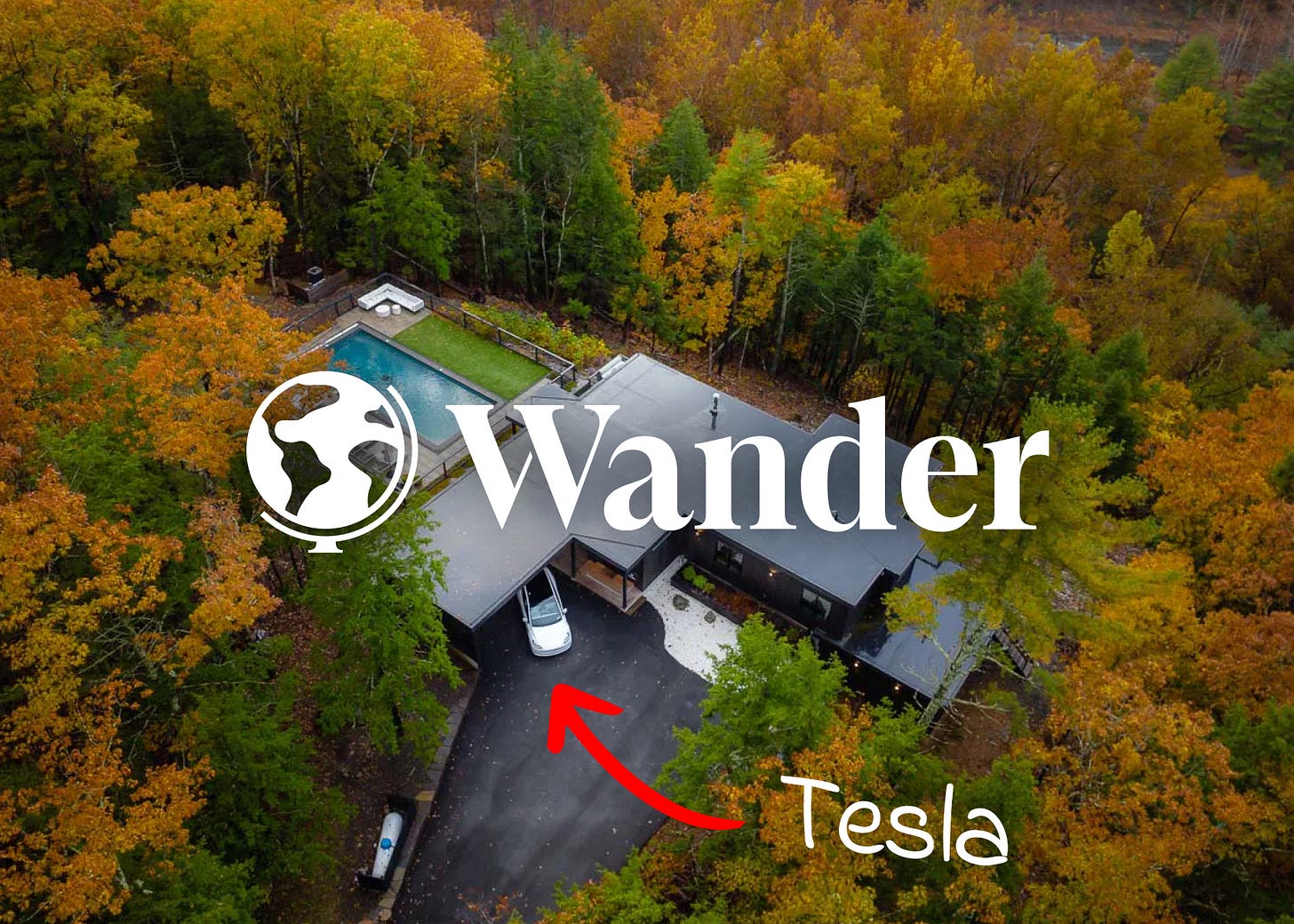
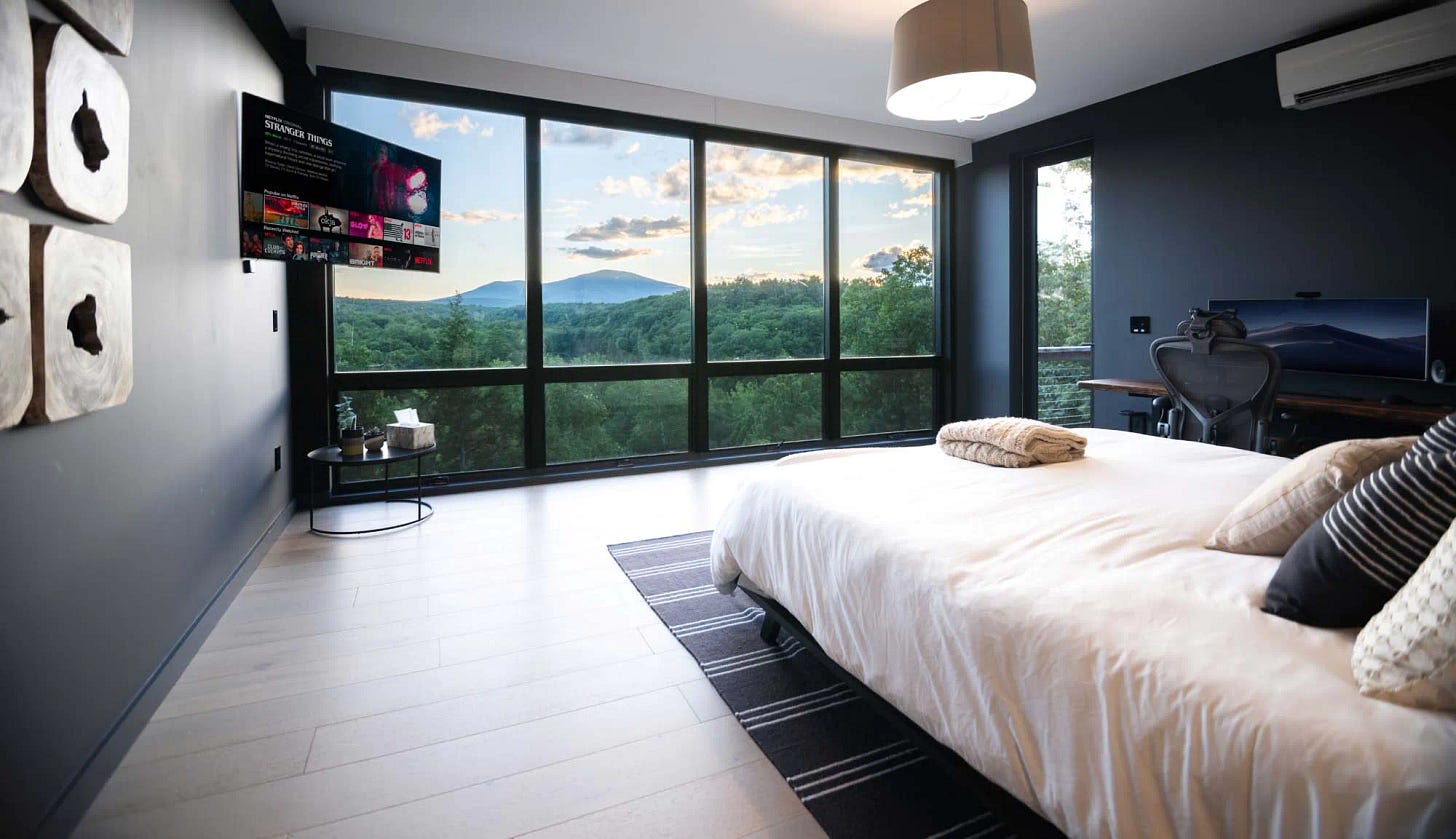
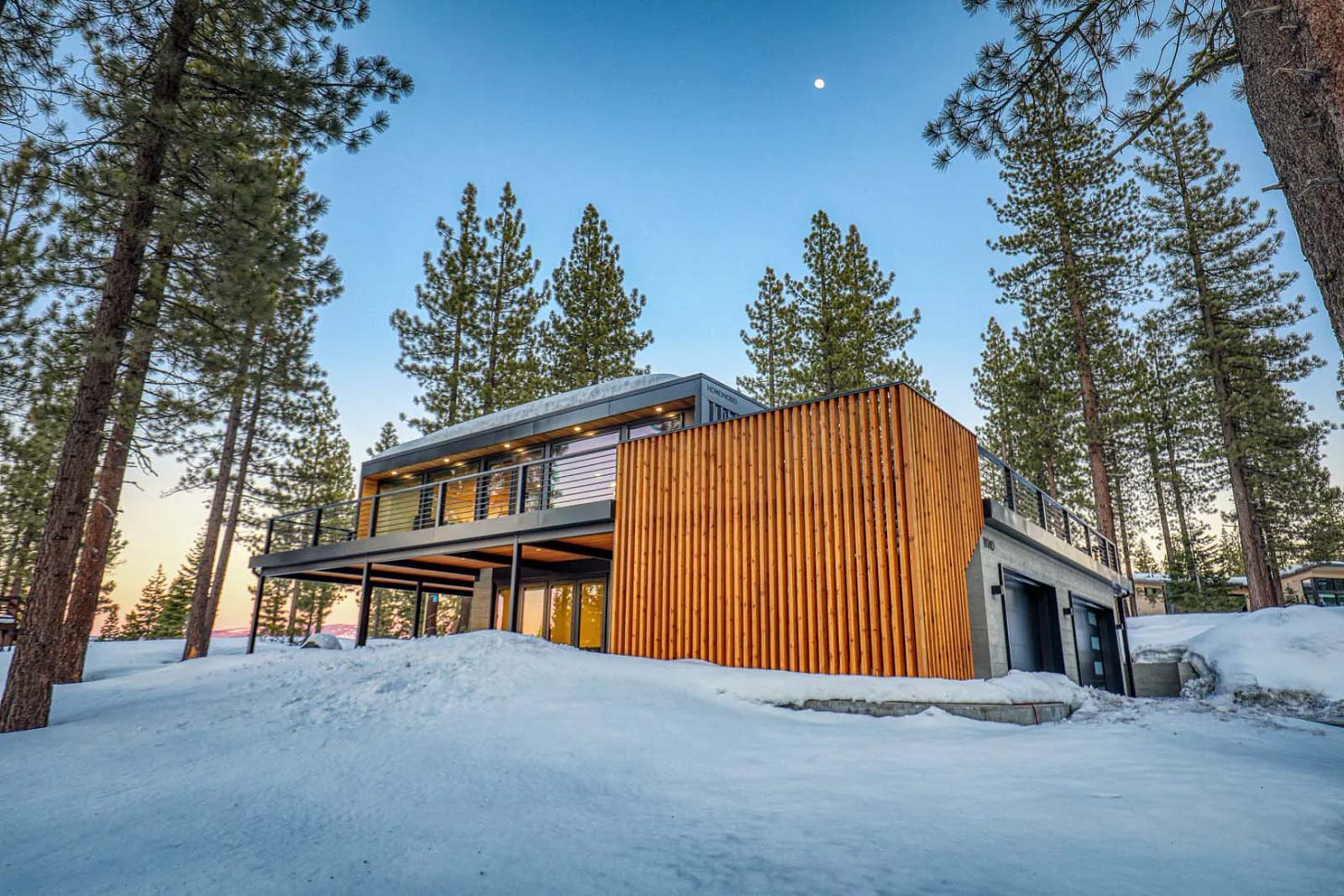
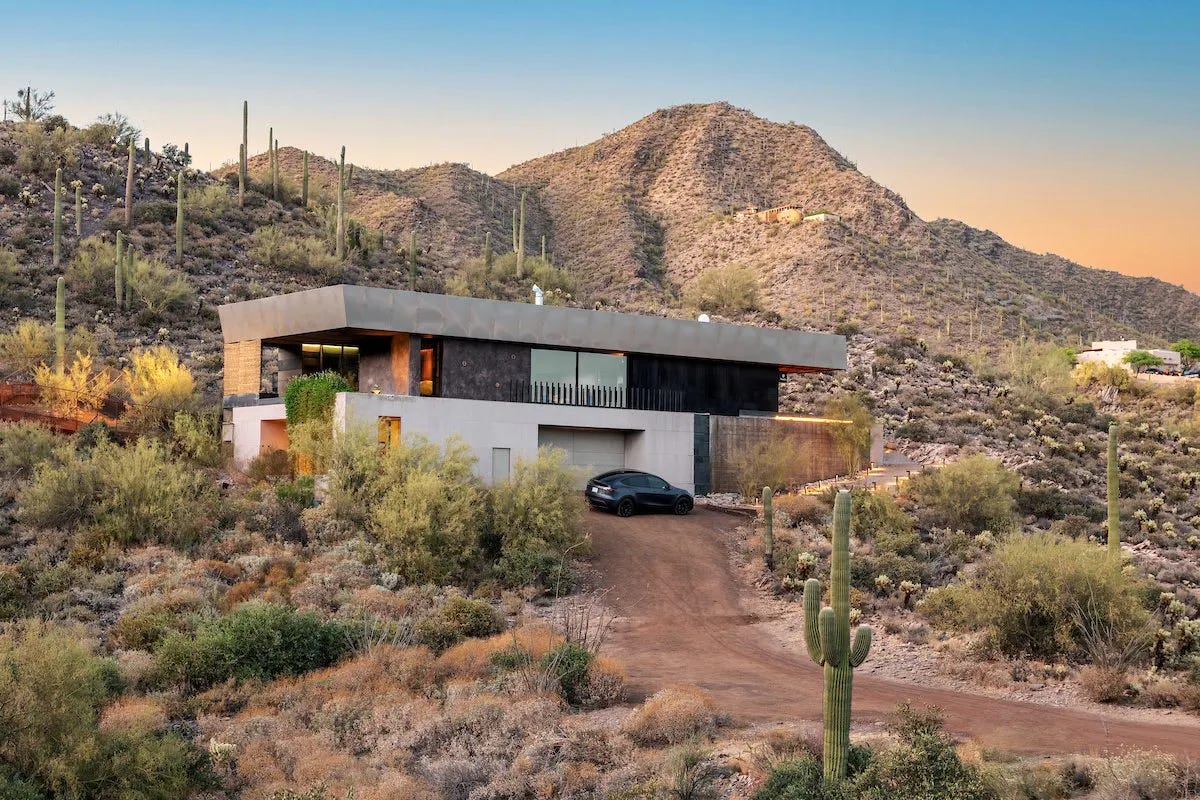
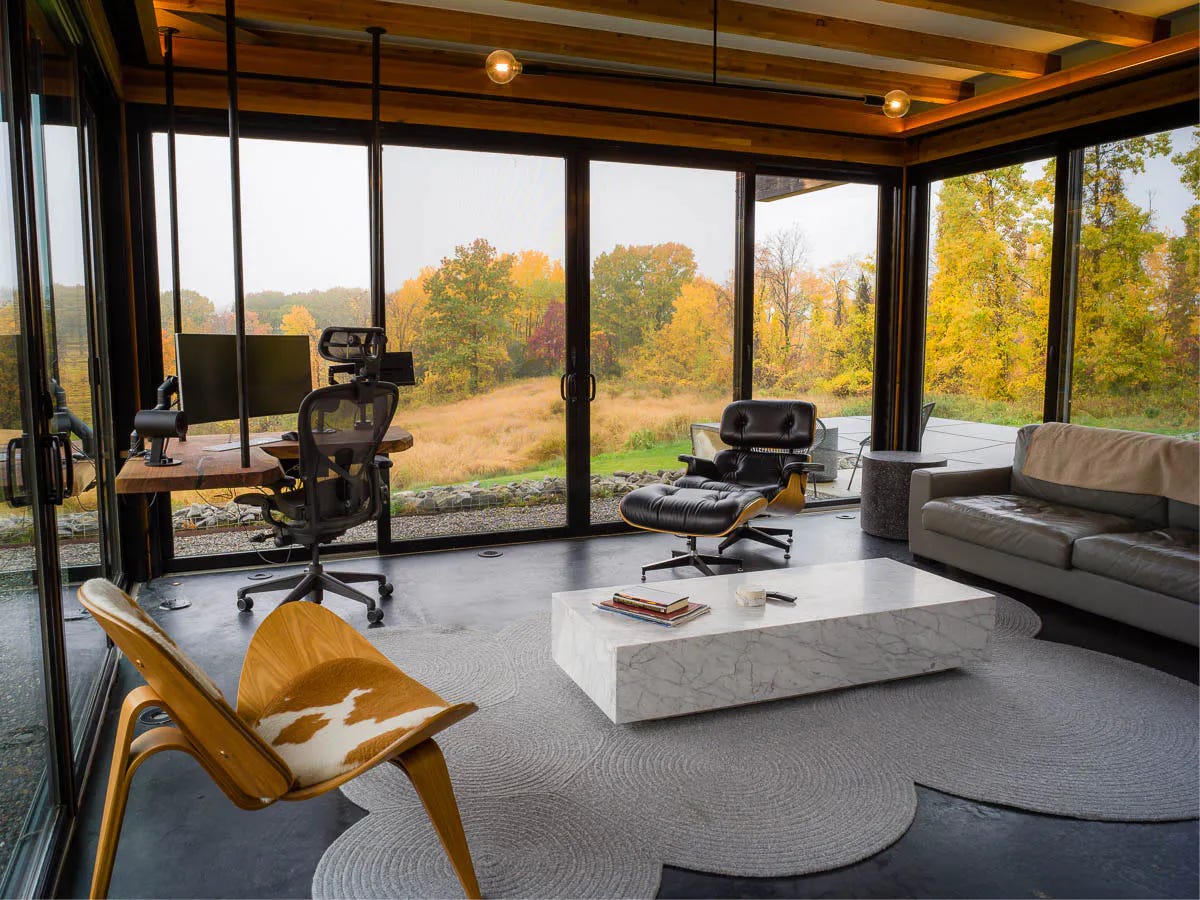

Jacob, this is great. Love the storytelling, the behind-the-scenes, and the analysis. Looks like a solid contender, once they reach scale. I just signed up, so thanks for the exposure, too! Hadn't heard of this one yet.
This is gold. Super engaging, and you’ve convinced me this is going to be a huge company. Any PM jobs lol? And love this 2 part format you’ve got going here -- keen for more ✌️